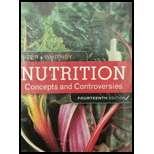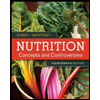
To determine:
Whether the statement ‘Fats play a few roles in the body, apart from being an abundant source of energy in the form of calories’ is true or false.
Given:
Fats are the abundant source of low-calorie energy in the body. It is the main function of fats in the body. Fats are the form of fuel, which can be stored in the body.
Introduction:
Fats play a vital role as the abundant source of energy and it can also be stored in the body to provide energy later and when required in the body. Fats have different functions apart from being the abundant source of low-calorie energy and storing form of energy in the body.
Want to see the full answer?
Check out a sample textbook solution
Chapter 5 Solutions
Bundle: Nutrition: Concepts and Controversies, Loose-leaf Version, 14th + LMS Integrated for MindTap Nutrition, 1 term (6 months) Printed Access Card
- Excess carbohydrates and proteins are stored as _____. a. amino acids b. starches c. fats d. monosaccharidesarrow_forwardWhich of the following statements is not true? a. Essential nutrients can be synthesized by the body. b. Vitamins are required in small quantities for bodily function. c. Some amino acids can be synthesized by the body, while others need to be obtained from diet. d. Vitamins come in two categories: fat-soluble and water-soluble.arrow_forward_______ is (are) a good source of omega-3 fatty acids that can reduce the risk of heart disease. a. Oatmeal b. Legumes c. Fish d. Com syruparrow_forward
- Effects of Dietary Fats on Lipoprotein Levels Cholesterol that is made by the liver or that enters the body from food does not dissolve in blood, so it is carried through the bloodstream by lipoproteins. Low-density lipoprotein (LDL) carries cholesterol to body tissues such as artery walls, where it can form deposits associated with cardiovascular disease. Thus, LDL is often called bad cholesterol. Highdensity lipoprotein (HDL) carries cholesterol away from tissues to the liver for disposal, so HDL is often called good cholesterol. In 1990, Ronald Mensink and Martijn Katan published a study that tested the effects of different dietary fats on blood lipoprotein levels. Their results are shown in Figure 2.23. In which group was the level of LDL (bad cholesterol) highest?arrow_forwardEffects of Dietary Fats on Lipoprotein Levels Cholesterol that is made by the liver or that enters the body from food does not dissolve in blood, so it is carried through the bloodstream by lipoproteins. Low-density lipoprotein (LDL) carries cholesterol to body tissues such as artery walls, where it can form deposits associated with cardiovascular disease. Thus, LDL is often called bad cholesterol. Highdensity lipoprotein (HDL) carries cholesterol away from tissues to the liver for disposal, so HDL is often called good cholesterol. In 1990, Ronald Mensink and Martijn Katan published a study that tested the effects of different dietary fats on blood lipoprotein levels. Their results are shown in Figure 2.23. Figure 2.23 Effect of diet on lipoprotein levels. Researchers placed 59 men and women on a diet in which 10 percent of their daily energy intake consisted of cis fatty acids, trans fatty acids, or saturated fats. Blood LDL and HDL levels were measured after three weeks on the diet; averaged results are shown in mg/dL (milligrams per deciliter of blood). All subjects were tested on each of the diets. The ratio of LDL to HDL is also shown. Source, Mensink RP, Katan MB, Effect of dietary trans fatty acids on high-density and low-density lipoprotein cholesterol levels in healthy subjects. NEJM 323(7):43945. An elevated risk of heart disease has been correlated with increasing LDL-to-HDL ratios. Rank the three diets according to their predicted effect on cardiovascular health.arrow_forwardUnlike saturated fats, the fatty acid tails of unsaturated fats incorporate one or more ________. a. phosphate group c. double bonds b. glycerols d. single bondsarrow_forward
 Comprehensive Medical Assisting: Administrative a...NursingISBN:9781305964792Author:Wilburta Q. Lindh, Carol D. Tamparo, Barbara M. Dahl, Julie Morris, Cindy CorreaPublisher:Cengage Learning
Comprehensive Medical Assisting: Administrative a...NursingISBN:9781305964792Author:Wilburta Q. Lindh, Carol D. Tamparo, Barbara M. Dahl, Julie Morris, Cindy CorreaPublisher:Cengage Learning Nutrition: Concepts and Controversies - Standalo...Health & NutritionISBN:9781305627994Author:Frances Sizer, Ellie WhitneyPublisher:Brooks Cole
Nutrition: Concepts and Controversies - Standalo...Health & NutritionISBN:9781305627994Author:Frances Sizer, Ellie WhitneyPublisher:Brooks Cole- Lifetime Physical Fitness & WellnessHealth & NutritionISBN:9781337677509Author:HOEGERPublisher:Cengage





